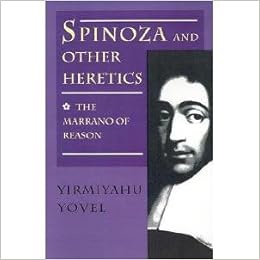Yirmiyahu Yovel shows how Spinoza grounded a philosophical revolution in a radically new principle--the philosophy of immanence, or the idea that this world is all there is--and how he thereby anticipated secularization, the Enlightenment, the disintegration of ghetto life, and the rise of natural science and the liberal-democratic state.The Marrano of ReasonThe Marrano of Reason finds the origins of the idea of immanence in the culture of Spinoza's Marrano ancestors, Jews in Spain and Portugal who had been forcibly converted to Christianity. Yovel uses their fascinating story to show how the crypto-Jewish life they maintained in the face of the Inquisition mixed Judaism and Christianity in ways that undermined both religions and led to rational skepticism and secularism. He identifies Marrano patterns that recur in Spinoza in a secularized context: a "this-worldly" disposition, a split religious identity, an opposition between inner and outer life, a quest for salvation outside official doctrines, and a gift for dual language and equivocation. This same background explains the drama of the young Spinoza's excommunication from the Jewish community in his native Amsterdam. Convention portrays the Amsterdam Jews as narrow-minded and fanatical, but in Yovel's vivid account they emerge as highly civilized former Marranos with cosmopolitan leanings, struggling to renew their Jewish identity and to build a "new Jerusalem" in the Netherlands.
I have just finished reading volume one of 'Spinoza and Other Heretics' entitled 'The Marrano of Reason'.
I have written elsewhere on the importance of the Dutch philosopher to green politics and the left, have a look here if you need some background.
I would not recommend this book as an introduction to Spinoza, one of the books by Steven Nadler would be better.
However I thought that this volume was interesting and made the case that the experience of the Marranos, Jews who remained secretly true to their faith while being forced to pretend to be Christians was important to the development of Spinoza's approach.
The Marranos were the Portuguese and Spanish ancestors of Spinoza who had to lead double lives, practicising a hidden faith under threat from the Inquisition.
The Marrano experience led, it is claimed, to some challenging Christianity, Islam and Judaism, and embracing a rationalist approach to religion, which either reject God or promoted a God of science and reason.
It was not that Spinoza was influenced or 'corrupted' by figures such as Uriel de Costa, while he met other sceptical Jews or ex-Jews, the Marrano experience provided a context for the development of his philosophy.
It is claimed that he was the 'Marrano of Reason' unable to publically state all of his radical views but hiding them in more respectable formulas.
Spinoza's words it is claimed often have double meanings.
A very important contribution to the study of Spinoza and whether you agree or not with its central thesis, the Marrano experience seems to have shaped the philosophers work.
I feel to understand Spinoza you have to follow his approach which stresses effects rather than causes, and his effects from secularism to liberalism and Marxism were spectacular. However while he rejected the ideas of looking at causes or lineages I think, and I guess this is a common opinion, understanding both the Marrano context and Jewish Medieval philosophy help us to understand his approach.



No comments:
Post a Comment